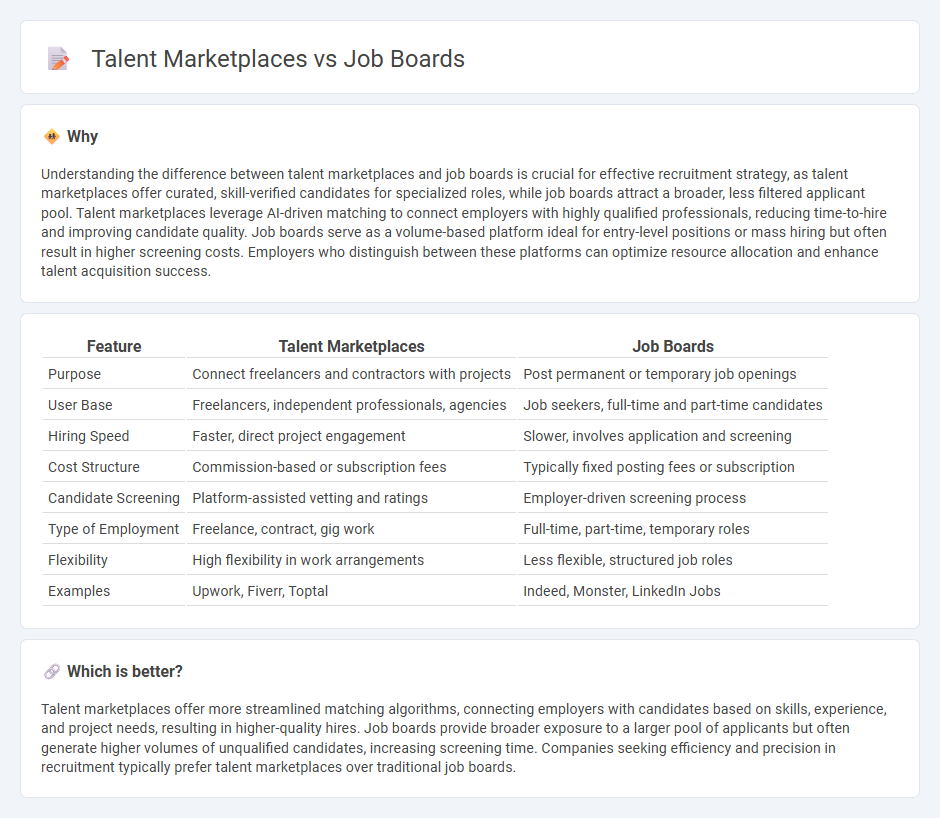
Talent marketplaces offer dynamic, personalized matching between employers and candidates using AI-driven algorithms, enhancing recruitment efficiency compared to traditional job boards that primarily list static job postings. These platforms provide access to a curated pool of pre-vetted professionals, streamlining the hiring process and reducing time-to-fill for critical roles. Explore how talent marketplaces revolutionize employment opportunities and optimize workforce acquisition by learning more about their benefits.
Why it is important
Understanding the difference between talent marketplaces and job boards is crucial for effective recruitment strategy, as talent marketplaces offer curated, skill-verified candidates for specialized roles, while job boards attract a broader, less filtered applicant pool. Talent marketplaces leverage AI-driven matching to connect employers with highly qualified professionals, reducing time-to-hire and improving candidate quality. Job boards serve as a volume-based platform ideal for entry-level positions or mass hiring but often result in higher screening costs. Employers who distinguish between these platforms can optimize resource allocation and enhance talent acquisition success.
Comparison Table
| Feature | Talent Marketplaces | Job Boards |
|---|---|---|
| Purpose | Connect freelancers and contractors with projects | Post permanent or temporary job openings |
| User Base | Freelancers, independent professionals, agencies | Job seekers, full-time and part-time candidates |
| Hiring Speed | Faster, direct project engagement | Slower, involves application and screening |
| Cost Structure | Commission-based or subscription fees | Typically fixed posting fees or subscription |
| Candidate Screening | Platform-assisted vetting and ratings | Employer-driven screening process |
| Type of Employment | Freelance, contract, gig work | Full-time, part-time, temporary roles |
| Flexibility | High flexibility in work arrangements | Less flexible, structured job roles |
| Examples | Upwork, Fiverr, Toptal | Indeed, Monster, LinkedIn Jobs |
Which is better?
Talent marketplaces offer more streamlined matching algorithms, connecting employers with candidates based on skills, experience, and project needs, resulting in higher-quality hires. Job boards provide broader exposure to a larger pool of applicants but often generate higher volumes of unqualified candidates, increasing screening time. Companies seeking efficiency and precision in recruitment typically prefer talent marketplaces over traditional job boards.
Connection
Talent marketplaces and job boards both serve as digital platforms designed to connect employers with potential candidates, streamlining the recruitment process. Talent marketplaces offer dynamic matching algorithms and project-based opportunities, while job boards primarily list static job postings categorized by industry or role. Integrating data from job boards into talent marketplaces enhances candidate visibility and optimizes hiring efficiency across various employment sectors.
Key Terms
Job Posting
Job boards primarily facilitate job posting by allowing employers to list open positions for candidates to browse, targeting a broad audience through categorized listings and keyword optimization. Talent marketplaces, on the other hand, leverage advanced algorithms and AI to match employers with pre-vetted candidates, offering a more curated and interactive hiring experience beyond traditional job postings. Discover the advantages of each approach to optimize your talent acquisition strategy effectively.
Candidate Matching
Job boards primarily function as platforms where employers post vacancies and candidates search for jobs, relying heavily on keyword matching and resume database searches for candidate matching. Talent marketplaces use AI-driven algorithms and real-time skill assessments to connect employers with candidates whose capabilities closely align with specific project needs and company culture. Explore how these approaches enhance hiring efficiency and candidate fit by discovering more about their unique matching technologies.
Fee Structure
Job boards typically charge employers a fixed fee per job posting or offer subscription-based pricing, making costs predictable but potentially expensive for multiple listings. Talent marketplaces often implement a commission-based fee structure, deducting a percentage from the freelancer's or contractor's earnings, aligning payment with project completion and success. Explore detailed comparisons of fee models to determine the most cost-effective platform for your recruitment needs.
Source and External Links
Best Job Boards for 2024 - Lists top job boards including Indeed, Google for Jobs, LinkedIn, ZipRecruiter, and CareerBuilder, detailing their strengths and usage.
5 Best Job Search Sites of July 2025 - Money - Highlights the best job search platforms like LinkedIn (best overall), Indeed (best for job diversity), Glassdoor (best for salary info), and ZipRecruiter (best mobile app).
USAJOBS - The Federal Government's official employment site - Official portal for federal job listings with detailed hiring process and eligibility guidelines for applicants.
 dowidth.com
dowidth.com